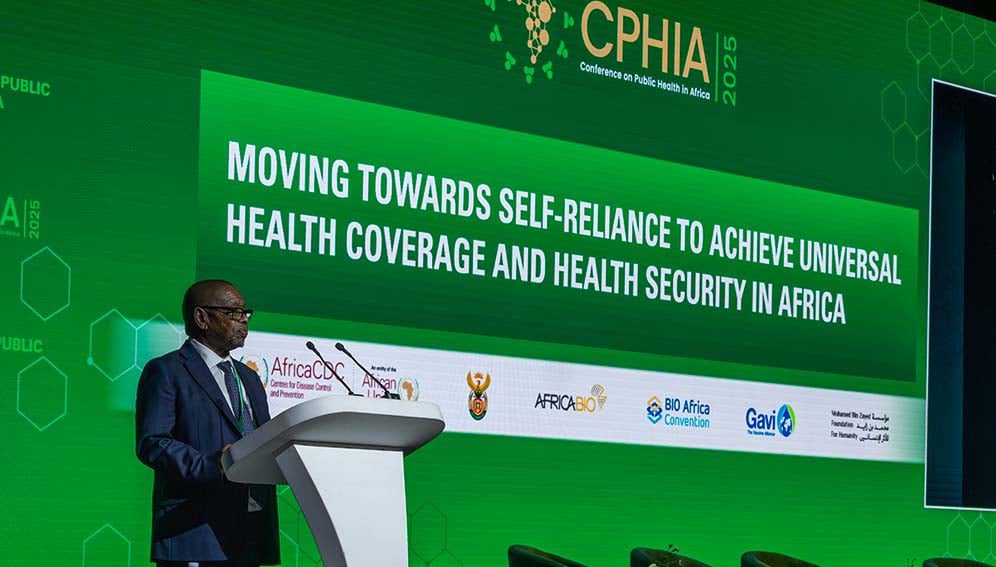By: Edwin Naidu
Send to a friend
The details you provide on this page will not be used to send unsolicited email, and will not be sold to a 3rd party. See privacy policy.
[DURBAN, SciDev.Net] African leaders urged the continent’s health community meeting in South Africa this week to turn crisis into opportunity, highlighting progress in vaccine manufacturing against a backdrop of drastic job losses and aid cuts.
South Africa’s Minister of Science, Technology and Innovation, Blade Nzimande, speaking at the 4th International Conference on Public Health in Africa (CPHIA 2025), hailed a new pan-African plan to boost regional manufacturing of vaccines and other drugs as a “truly historic development”.
The Africa CDC-led Pharmaceutical Manufacturing Plan — spearheaded by the African Union, Afreximbank, and Gavi, the vaccine alliance, with a US$3.2 billion investment — aims to ensure that by 2040 at least 60 per cent of all vaccines used in Africa are produced within Africa’s own borders, Nzimande said.
By the end of this year, 10 per cent of the continent’s vaccine needs would be met locally under the plan launched earlier this year.
“It is about more than new facilities or technology transfers, it is an integrated ambition — to equip Africa’s people, scientists, and manufacturers with the tools and skills to secure the continent’s health sovereignty,” Nzimande told the conference in Durban on Thursday (23 October).
He said the plan centres on expanding manufacturing capacity for vaccines and other biologics — drugs made from living organisms — through regional hubs, as well as implementing WHO-quality standards and improving drug regulations through the African Medicines Agency.
CPHIA 2025 opened on Tuesday at the Durban International Convention Centre with the theme: “Moving Towards Self-Reliance to Achieve Universal Health Coverage and Health Security in Africa”.
The conference put the spotlight on African-led innovations, policy solutions, and research aimed at building resilient, self-reliant healthcare systems, tailored to the needs of people across the continent.
“Our challenge and obligation as policymakers, researchers, and industrialists is to turn these plans into performance, and these ambitions into real changes in the lives of the people we serve,” said Nzimande.
Cyril Xaba, mayor of the eThekwini municipality, of which Durban is a part, said the conference was taking place against the backdrop of “unprecedented retrenchment in aid spending”. This is leading to deep cuts and restructuring across the global health landscape, with immediate consequences for vital health programmes, he warned.
“This is a crisis different to anything that has preceded it,” he told delegates at the opening on Tuesday.
“Yet it also presents us all with an opportunity to create a new system that not only better serves the priorities and aspirations of African countries, but also delivers a health security and prosperity dividend for the African region.”
Bilateral overseas development aid for countries in sub-Saharan Africa is projected to decline by between16 and 28 per cent this year, following a two per cent decline in 2024, according to the Organisation for Economic Co-operation and Development (OECD).
Overseas development aid for health could fall to levels not seen since the mid-2000s, the OECD warns.
Calls for African solutions to respond to the cuts were repeated throughout the conference.
Discussions emphasised the need for a broad system-wide approach to vaccine production in Africa and for innovative financing for sustainable health systems.
The conference heard how 2024 was a record year for the co-payments made by Gavi-supported countries towards their own vaccine programmes, with annual payments exceeding US$250 million for the first time.
Gavi’s African Vaccine Manufacturing Accelerator has so far attracted 13 manufacturers, with facilities set to become operational in Egypt, Morocco, South Africa and Senegal.
Hosted by the Africa Centers for Disease Control and Prevention (Africa CDC) and co-organised with the Government of South Africa and AfricaBio’s BIO Africa Convention, delegates from more than 20 countries gathered in Durban, including representatives from the African Union Commission, WHO, UNICEF, Gavi and the Global Fund.
According to Jean Kaseya, director-general of Africa CDC, the continent’s evolving role in health means that “for the first time, Africa is inspiring the world”.
“The world is learning from Africa,” he told the conference.
“This reform of global architecture means we are co-architects. We are 1.4 billion proud Africans making our own agenda. We are proud of that.”
South Africa is the third country to host the conference since its inception in 2021. This year’s gathering is a precursor to the G20 Health Ministers’ meeting in early November under South Africa’s G20 Presidency.
At its close on Saturday (25 October), CPHIA 2025 will produce an outcome statement that advances Africa’s health future, ensuring that African-led solutions remain central to global health reform.
Nhlanhla Msomi, president of AfricaBio, an independent, non-profit biotechnology association, underscored the urgency of building innovation capacity.
“We know that our healthcare industry on the continent at large is using borrowed technologies, borrowed ideas, and borrowed science,” he told the conference.
“Unless we move away and decouple from that, we’re not likely to win this battle.”
This piece was produced by SciDev.Net’s Sub-Saharan Africa desk.


